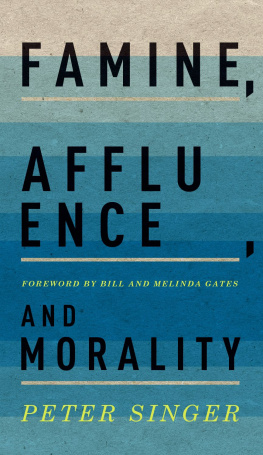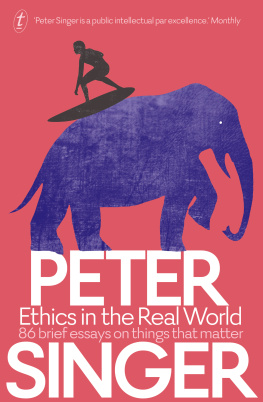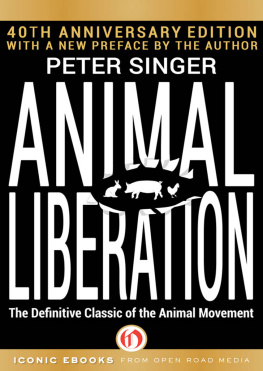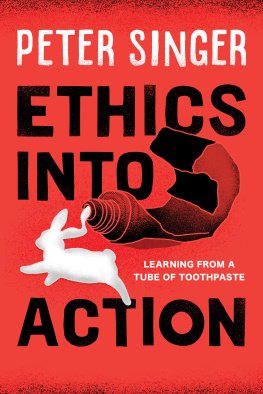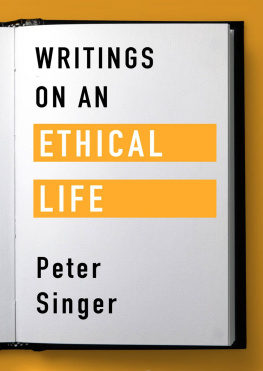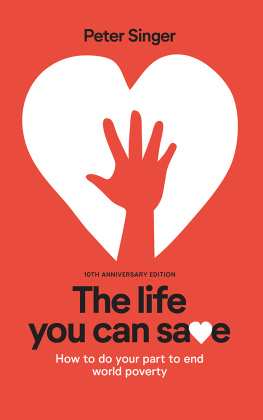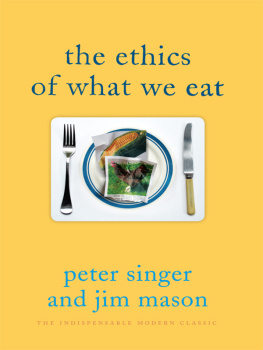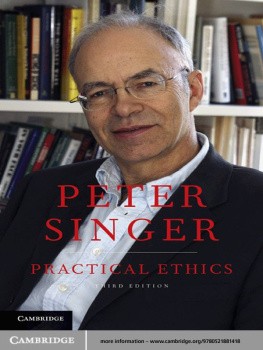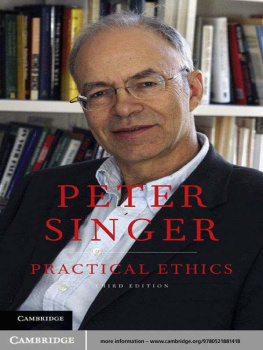Famine, Affluence, and Morality

Oxford University Press is a department of the University of Oxford. It furthers the Universitys objective of excellence in research, scholarship, and education by publishing worldwide.
Oxford New York Auckland Cape Town Dar es Salaam Hong Kong Karachi Kuala Lumpur Madrid Melbourne Mexico City Nairobi New Delhi Shanghai Taipei Toronto
With offices in Argentina Austria Brazil Chile Czech Republic France Greece Guatemala Hungary Italy Japan Poland Portugal Singapore South Korea Switzerland Thailand Turkey Ukraine Vietnam
Oxford is a registered trade mark of Oxford University Press in the UK and certain other countries.
Published in the United States of America by Oxford University Press 198 Madison Avenue, New York, NY 10016
Peter Singer 2016
All rights reserved. No part of this publication may be reproduced, stored in a retrieval system, or transmitted, in any form or by any means, without the prior permission in writing of Oxford University Press, or as expressly permitted by law, by license, or under terms agreed with the appropriate reproduction rights organization. Inquiries concerning reproduction outside the scope of the above should be sent to the Rights Department, Oxford University Press, at the address above.
You must not circulate this work in any other form and you must impose this same condition on any acquirer.
Library of Congress Cataloging-in-Publication Data
Singer, Peter, 1946- author.
Famine, affluence, and morality / Peter Singer.
pages cm
Includes index.
ISBN 9780190219208 (cloth : alk. paper)
ebook ISBN 9780190219222
1. Humanitarianism. 2. FaminesMoral and ethical aspects.
3. PovertyMoral and ethical aspects. 4. SufferingMoral and ethical aspects. 5. WealthMoral and ethical aspects. I. Title.
BJ1475.3.S56 2015
170dc23 2015005676
9 8 7 6 5 4 3 2 1
Typeset in Miller Text Font Printed in the United States of America on acid-free paper
Contents
The world has improved dramatically in the more than forty years that have passed since Singer wrote Famine, Affluence, and Morality. The proportion of the worlds population living in extreme poverty today is less than half what it was then, and the proportion of children who die before their fifth birthday has plunged even more. In 1960, almost 20 percent of the worlds children died before their fifth birthday. By 1990, it was around 10 percent, and now its closer to 5 percent.
But 5 percent is still too manyon the order of 6.3 million child deaths a year. Most of these deaths are the result of conditions like diarrhea, pneumonia, or malaria that we know how to prevent or cure. Nevertheless, the reduction in child deaths is encouraging. It shows that aid does work and refutes the damaging myth that foreign aid does no good.
Singers work argues that we can work together to prevent very bad things from happeninglike the deaths of children. The evidence for this claim is much stronger now than it was in 1972. Fortunately, more and more people are seeing that this is the case, and many of them are also taking action. You might suggest that Singers article was ahead of its time when it was originally published. But perhaps its time has now come.
Bill and Melinda Gates, co-chairs, The Bill and Melinda Gates Foundation
Famine, Affluence, and Morality was written at the height of the refugee crisis brought about by military repression in what was then East Pakistan. Nine million people fled across the border into India, where they struggled to survive in refugee camps. With the benefit of hindsight, we can see the crisis as a pivotal stage in the emergence of Bangladesh as an independent nation, but at the time that fortunate outcome seemed improbable, whereas the immense number of people in peril was apparent. I used the dire emergency as a springboard for my argument that people in affluent nations should be doing much more to help people in great need in much poorer parts of the world, but that argument is quite general in its application, and the challenge it presents remains as confronting today as it was in 1971.
Ethics and political philosophy were then on the verge of an exciting new transformation. For the previous twenty-five years moral philosophy had focused on analyzing the meanings of moral terms like good and ought and this was assumed to have no implications for substantive questions about how we ought to live. A. J. Ayer wrote that it is a mistake to look to moral philosophers for guidance and Peter Laslett seemed to be summing up a widespread view with his oft-quoted line: For the moment, anyway, political philosophy is dead. That moment lasted until the student protest movement of the 1960s demanded courses that were relevant to the major issues of the day: civil rights, racial discrimination, the war in Vietnam, and civil disobedience. Then some philosophers recalled that their tradition had, in previous eras, had a lot to say about these topics. The launch of a new journal Philosophy & Public Affairs was announced with a Statement of Purpose proclaiming that a philosophical examination of issues of public concern can contribute to their clarification and their resolution. (Today, it is hard to believe that a statement so cautiously phrased could be regarded as radical.) Thus began, or rather was revived, the field now known as practical or applied ethics.
When the soon-to-be-launched journal began inviting the submission of papers, I was a recent Oxford graduate, just starting my first academic position. Already as an undergraduate in Australia I had been involved in the abortion law reform movement and the opposition to the war in Vietnam. At Oxford I had written my thesis on the basis of the obligation to obey the law in a democracy. I was eager to tackle, in a philosophical way, the important ethical questions that I faced in my own life. The launch of Philosophy & Public Affairs provided the perfect opportunity to do so. Famine, Affluence, and Morality appeared in spring 1972, in the third issue of the first volume.
The article soon became a staple of courses in ethics. An incomplete list of anthologies in which it has been reprinted runs to fifty. Each year it is read by thousands of undergraduates and high school students in many different countries. Yet until recently, it was probably more often used to pose an intellectual puzzle rather than to challenge students to consider if they are living ethically. Professors presented it by saying: Here is an article with an argument that seems to be sound, but the conclusion is impossibly demanding. Find the flaw in the argument. Over the past decade, however, more and more students, and at least some of their professors, took a different stance. They found no flaw in the argument and were keen to explore its ethical implications. Here are a few examples:
Toby Ord read the essay when he was a philosophy student. He went on to found Giving What We Can, which encourages people to pledge to give 10 percent of their pre-tax income, until retirement, to the charities that they believe will do the most good. Members of Giving What We Can have, at the time of writing, donated over 8 million and the pledges already made commit them to donating an estimated 457 million over their lifetimes.
Chris Croy was assigned Famine, Affluence, and Morality for a class he took at St. Louis Community College, in Meramec, Missouri. The class also read an opposing essay in which the philosopher John Arthur argued that if my argument were sound, it would follow that we should also aid others by giving parts of our bodies, such as a kidney. Arthur held that this cant be right: the fact that more good will come from such a donation is not enough, he thought, to show that we ought to do it. To Croy, that seemed more like an argument for donating a kidney than against giving to people in extreme poverty. After thinking hard about it, and discussing it with a friend, he called a local hospital, and subsequently donated one of his kidneys to a stranger (who turned out to be a 43-year-old schoolteacher working at a school that serves mostly poor children).

